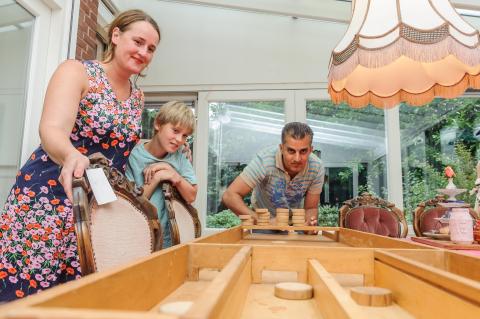Staying with a local helps refugee integration
When refugees receive a residence permit, it may take weeks or even months before they are assigned a home. Normally they stay in an asylum accommodation center (AZC) during that time, but it is also possible to move in temporarily with a host family. Staying with a local helps integration, according to Hans van Dijk, Quita Muis (Tilburg University), Lena Knappert (Free University Amsterdam) and Sophie Alkhaled (Lancaster University) in their publication in the Journal of Immigrant & Refugee Studies. “Given the positive experiences, we may surely speak of a best practice for integration,” says Van Dijk.
Van Dijk c.s. provide a qualitative evaluation of a social innovation (TakeCareBnB) that aims to facilitate integration by providing refugees an opportunity to reside temporarily with locals. TakeCareBnB helps refugees and host families to get in touch with each other, looking for a good match. TakeCareBnB asked Hans van Dijk to evaluate the experiences of both refugees and host families. Van Dijk took on the research under the condition that it had to be a fair story, even if the experiences of the host family turned out to be negative. The research was conducted on 51 host families.
Language and culture
Hans van Dijk: “There are ten areas in which integration is important. Some are quite logical, such as housing or getting to know Dutch people. But it also helped with other aspects of integration, such as finding work and learning the Dutch language and culture. For example, one refugee indicated that in the AZC he mainly interacted with people with the same cultural background.”
Open up
Quita Muis, PhD student in Sociology at Tilburg University, adds. “Supporting host families did help enormously in almost all areas. Integration is often seen as an effort refugees should make: they must adapt. But our research shows that refugees are much more capable of doing so if the Dutch open up, the most extreme act being hosting refugees in their own homes and thus sharing their lives with the refugee.”

Enriching experience
Hans van Dijk: “Of course, that wasn't always easy. Host families indicated that hosting a refugee was not always convenient. Of the 51 guest families, only a few rated the experience as negative. For example, one family indicated that they had a very different rhythm of life than the refugee. But the vast majority found the sheltering of a refugee an enriching experience, indicated to have learned a lot about the background and problems of refugees, and was also very pleased to be able to help the integration of refugees. Given all these positive experiences, we may surely speak of a best practice for integration.”
Emotional theme
“Since World War II, the number of refugees has never been higher: 1% of the world's population”, says Quita Muis. “Countries are struggling with the problem: sheltering is a politically highly charged topic, especially now that due to corona, priorities soon shift elsewhere. In addition, the integration of refugees has not always gone well. That's why research on aspects that contribute to the integration of refugees is important."
The present study was recently published in the leading international journal Journal of Immigrant & Refugee Studies, entitled Roomies for life? An assessment of how staying with a local facilitates refugee integration. Authors: Hans van Dijk, Organization Studies, Quita Muis MSc, Sociology (both Tilburg U), Lena Knappert , HR Studies (Free U A'dam) and Sophie Alkhaled, Entrepreneurship (Lancaster U).
Contact
For further information, please contact Hans van Dijk, e-mail: j.vandijk1@tilburguniversity.edu , tel. 06-52644306. The study can be downloaded for free here.
The publication is a follow-up study of the report published in July 2019 by the Verweij Jonker Institute (in Dutch) on the pilot ‘Logeerregeling’ (lodging arrangement) with which the government wanted to increase the possibilities of refugee stay with host families in collaboration with TakeCareBnB.
Photo: TakeCareBnB
